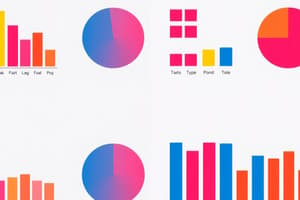Podcast
Questions and Answers
So much information, in fact, that it would be easy to get lost in all the data available in ______.
So much information, in fact, that it would be easy to get lost in all the data available in ______.
cyberspace
A search string is a combination of words that you use to come up with relevant results and lead you to what you are looking for using ______ websites.
A search string is a combination of words that you use to come up with relevant results and lead you to what you are looking for using ______ websites.
search engine
Let us start with the first tool that any student nowadays would use to do research-the ______.
Let us start with the first tool that any student nowadays would use to do research-the ______.
Internet
Remember that just because information is available does not mean you should just get it and use it right-away appropriating something, such as an idea, as yours is considered ______.
Remember that just because information is available does not mean you should just get it and use it right-away appropriating something, such as an idea, as yours is considered ______.
Google also provides its own customized platform for scholarly research, called ______.
Google also provides its own customized platform for scholarly research, called ______.
Treat anything you find online as a ______ and use the same historical methods you have learned to analyze the data you get online.
Treat anything you find online as a ______ and use the same historical methods you have learned to analyze the data you get online.
You may use it to find electronic journal articles, materials from institutional repositories, and book chapters from many different ______.
You may use it to find electronic journal articles, materials from institutional repositories, and book chapters from many different ______.
Google ______ (www.books.google.com) also provides sources for scanned books.
Google ______ (www.books.google.com) also provides sources for scanned books.
Wikipedia is the biggest open ______ encyclopedia in the whole of cyberspace.
Wikipedia is the biggest open ______ encyclopedia in the whole of cyberspace.
In 2017, it has 40 million articles in ______ languages.
In 2017, it has 40 million articles in ______ languages.
Project ______ (www.gutenberg.org) is the oldest digital library in the world.
Project ______ (www.gutenberg.org) is the oldest digital library in the world.
Another online ______ you may use is Internet Archive (www.archive.org).
Another online ______ you may use is Internet Archive (www.archive.org).
Flashcards are hidden until you start studying
Study Notes
Research Tools and Techniques
- Online search engines like Google can be a good starting point for research, providing an overview of existing published material on a topic.
Google Books
- Google Books (www.books.google.com) provides scanned books, allowing users to read some chapters for free, which can help determine if a book is useful for research before obtaining a physical copy.
Wikipedia
- Wikipedia is the largest open-source encyclopedia, with 40 million articles in 293 languages as of 2017.
- Anyone can contribute or edit articles, making some information unreliable.
- Wikipedia can be used to gain a general overview of a topic, but exercise caution and verify information with credible sources.
Free Online Resources
- Project Gutenberg (www.gutenberg.org) is the oldest digital library, founded in 1971, offering over 50,000 items, including works about the Philippines.
- Internet Archive (www.archive.org) is an online library providing digital versions of books and other works, including 279 billion web pages, 11 million books, and texts.
Conducting Online Research
- The Internet is a valuable resource for research, but it's essential to use it properly to avoid plagiarism.
- Treat online information as sources and apply historical methods to analyze data.
- Knowing where and how to look is crucial; using specific search strings can lead to more refined results.
- Google Scholar (www.scholar.google.com) is a customized platform for scholarly research.
Studying That Suits You
Use AI to generate personalized quizzes and flashcards to suit your learning preferences.




